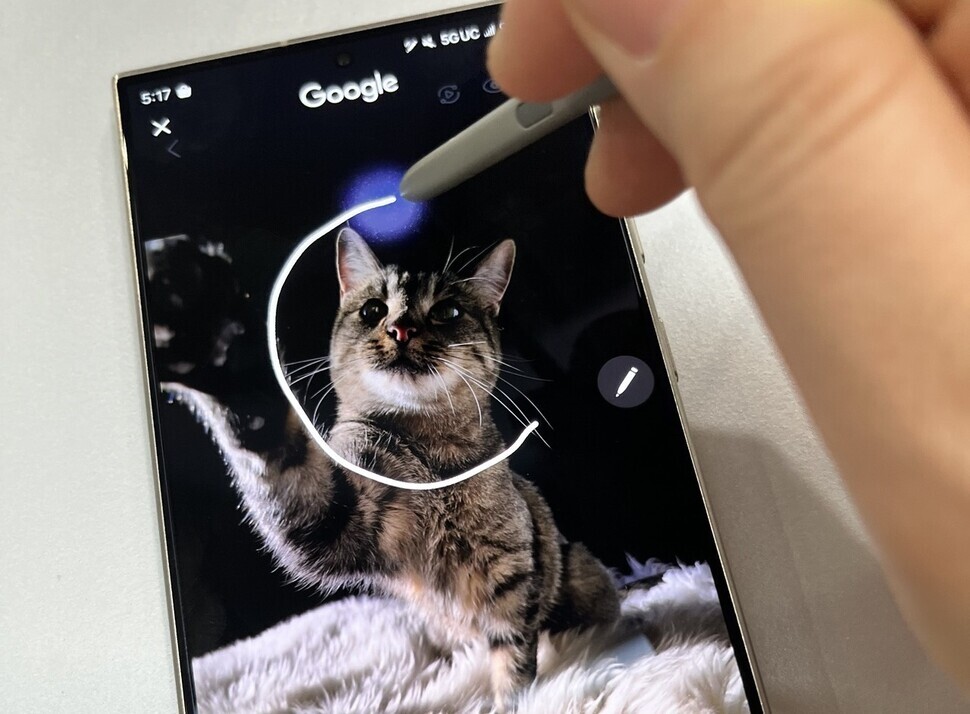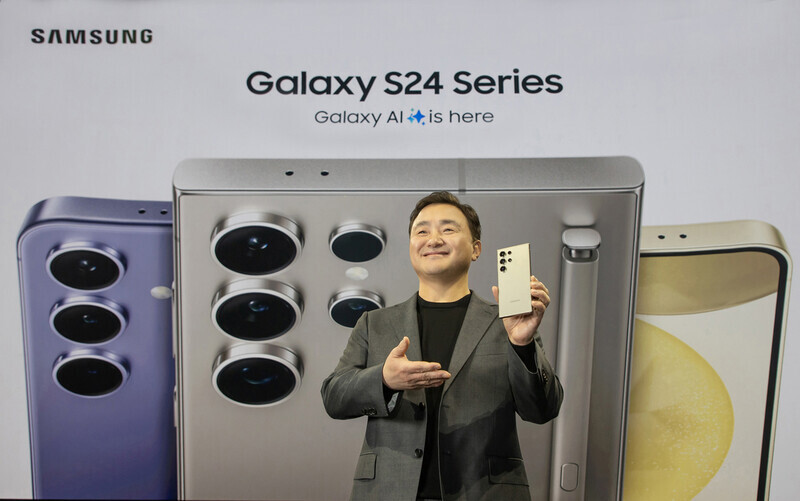hankyoreh
Links to other country sites 다른 나라 사이트 링크
Are Samsung’s latest AI-powered phones all they’re made out to be?

Want to get a closer look at the cute cat that popped up in a video? Press your screen, and you’ll be able to see the video in slow motion.
If you want to know where a certain passerby bought their bag, point your phone camera at them, draw a circle around the bag, and voila! The search is already complete.
Recorded audio files can be converted into text, paraphrased, and translated, with artificial intelligence generating different styles of communication based on context.
The camera, with its enhanced zoom feature, will allow anyone, even in dark concert halls, to take clear pictures of their star crush.
Samsung Electronics has lifted the curtain on the era of AI-enabled smartphones. On Wednesday (local time) in San Jose, California, Samsung held its “Galaxy Unpacked 2024” event, where it revealed its new Galaxy S24 premium smartphone series, focusing on its AI features.
The slogan “Galaxy AI is here” hung in the middle of the event hall, where attendees could experience the new Galaxy smartphone for the first time. The new Galaxy S24 series will be the first phones from Samsung to bear the name “Galaxy AI.”
The phones are also equipped with a new search function from Google, the developer of the Android system, known as “Circle to Search.” This feature, activated by holding down the home button, provides the user with relevant search results after the user draws a circle on an image or word on the screen, and was one of the most talked-about features at the unveiling.
Android developers have joined forces to stake out a dominant position in the AI smartphone market.
AI smartphones refer to devices that have been designed with high-performance chips that provide on-device AI technology-related features.
A demonstration of the Galaxy S24 at the event showed that the device could, in real time, translate phone calls into 13 languages, even when disconnected from the internet, and could also transform audio into text.

The feature that seems to resonate most with the spirit of on-device AI technology is the keyboard. A real-time translation feature has been added to the keyboard itself, which means that texts, as well as messages sent through other messaging apps such as Kakao Talk, can be translated as the words are being typed.
“We’re excited to see how our users around the world empower their everyday lives with Galaxy AI to open up new possibilities,” said Roh Tae-moon, the head of Samsung’s mobile experience division, during the presentation.
Since the translation will happen through on-device AI intelligence, there is no need to be concerned about the content of a recorded conversation becoming public, Roh said. The user can use the function to their heart’s content without worrying about security breaches.
However, these features are not without their limitations. Most features that utilize generative AI technology can only be accessed when connected to the internet.
Such features include the image editing features, which allow edits to fill in parts of an image background if a picture is crooked or if the background has been cropped out by mistake, and the Circle to Search feature.
When the device paraphrases various voice recordings, such as phone calls, or notes, the content is sent to Samsung’s servers in order to receive the aid of generative AI.
This is at odds with Samsung’s claim that “the content of the calls will not leave the smartphone.”
Others also expressed disappointment that the “Ultra” line series does not use Samsung’s Exynos 2400 chipset, but Qualcomm’s Snapdragon 9 Gen 3 smartphone processor.
The Galaxy S24 series will be available worldwide starting from January 31.
In South Korea, prices for the basic model range from 1.15 million won to 1.29 million won depending on memory capacity, while the Plus model is priced between 1.35 million and 1.49 million, and the Ultra at 1.69 million to 2.12 million.
By Lim Ji-sun, staff reporter
Please direct questions or comments to [english@hani.co.kr]

Editorial・opinion
![[Editorial] Intensifying US-China rivalry means Seoul must address uncertainty with Beijing sooner than later [Editorial] Intensifying US-China rivalry means Seoul must address uncertainty with Beijing sooner than later](https://flexible.img.hani.co.kr/flexible/normal/500/300/imgdb/original/2024/0517/8117159322045222.jpg) [Editorial] Intensifying US-China rivalry means Seoul must address uncertainty with Beijing sooner than later
[Editorial] Intensifying US-China rivalry means Seoul must address uncertainty with Beijing sooner than later![[Column] When ‘fairness’ means hate and violence [Column] When ‘fairness’ means hate and violence](https://flexible.img.hani.co.kr/flexible/normal/500/300/imgdb/original/2024/0516/7417158465908824.jpg) [Column] When ‘fairness’ means hate and violence
[Column] When ‘fairness’ means hate and violence- [Editorial] Yoon must stop abusing authority to shield himself from investigation
- [Column] US troop withdrawal from Korea could be the Acheson Line all over
- [Column] How to win back readers who’ve turned to YouTube for news
- [Column] Welcome to the president’s pity party
- [Editorial] Korea must respond firmly to Japan’s attempt to usurp Line
- [Editorial] Transfers of prosecutors investigating Korea’s first lady send chilling message
- [Column] Will Seoul’s ties with Moscow really recover on their own?
- [Column] Samsung’s ‘lost decade’ and Lee Jae-yong’s mismatched chopsticks
Most viewed articles
- 1Celine Song says she’s gratified global audiences have responded to the kismet of ‘inyeon’
- 2[Editorial] Transfers of prosecutors investigating Korea’s first lady send chilling message
- 3[Exclusive] Unearthed memo suggests Gwangju Uprising missing may have been cremated
- 4Highly educated high-earners at risk of being replaced by AI, BOK study says
- 5[Column] US troop withdrawal from Korea could be the Acheson Line all over
- 6Xi, Putin ‘oppose acts of military intimidation’ against N. Korea by US in joint statement
- 7For new generation of Chinese artists, discontent is disobedience
- 8Truth commission confirms Korean War killings by soldiers and police
- 9USFK sprayed defoliant from 1955 to 1995, new testimony suggests
- 10[Column] “Hoesik” as ritual of hierarchical obedience